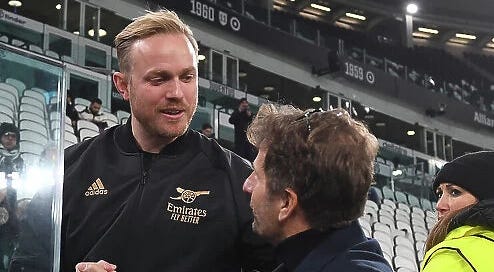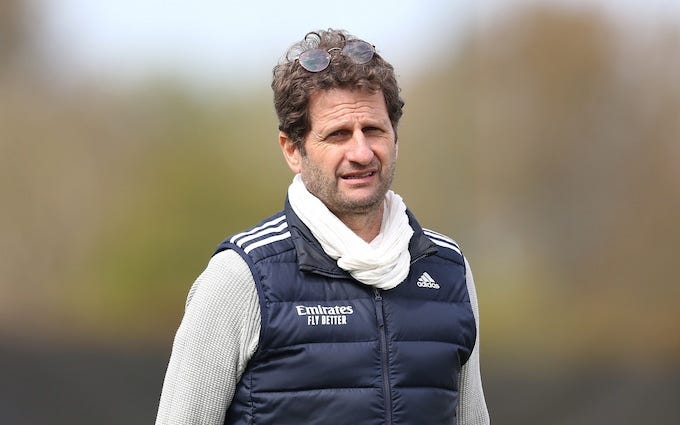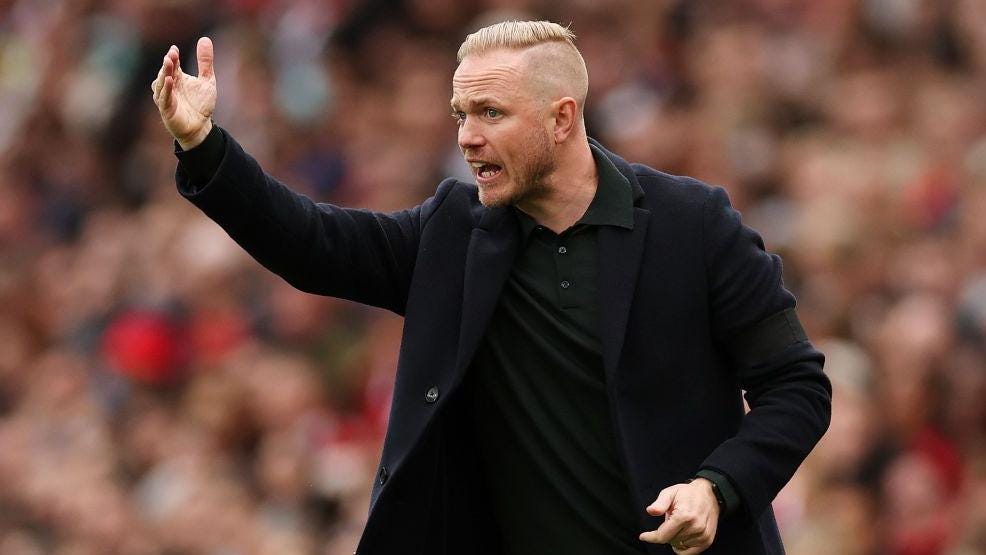'With our principles, we always give the players the tools to get at least a 6 or 7 out of 10 performance wise and to allow them to build from there.’ This is a quote from an interview I conducted with Joe Montemurro back in May 2019 just after Arsenal had won the WSL title under his stewardship.
Joe was a big picture, philosophy coach. He had a template and a style and then allowed his talented attackers the freedom to riff on top of it. It meant that Arsenal totally blew away the teams in the lower half of the league. Arsenal did not drop a single point against a team outside of the top four between April 2018 and January 2021.
However, in the bigger games, which required a little more tactical detail and where individual player freedom has slightly less importance when matched against equivalent players, Arsenal looked lost. They simply could not lay a glove on Manchester City or Chelsea, especially away from home. Arsenal lost six of their seven trips to Kingsmeadow under Joe (amazingly, the sole victory was a 5-0!) They didn’t win at the Academy Stadium under his charge.
They also lost two finals to Chelsea and a final to Manchester City. Arsenal just could not solve the issue of floundering against bigger teams, especially when faced with the sort of high press City and Chelsea were capable of (PSG likewise suffocated Arsenal in a UWCL tie in August 2020).
Ultimately, these were issues that Arsenal could not solve under Montemurro and he resigned at the end of the 2020-21 season. So you can see why the club opted for a coach like Jonas Eidevall, whose attention to detail, structure and preference for a high press offered a fix to some of the issues from the back end of the Montemurro era.
The record against the bigger opponents immediately improved under Eidevall and stayed pretty solid for his entire reign. Even this season, the home draw with Manchester City and the home defeat to Chelsea have been comfortably the best league performances of the season and the Gunners have been unlucky to only take a single point from those two games.
The issue is that, in hindsight, Arsenal over corrected. The team were strong in big games because Eidevall is an excellent tactical micro manager. When the game plan depends on finding the weaknesses of strong opposition and nullifying their strengths, when games require a lot of attention to detail, Eidevall’s approach shines.
The consistent adherence to a midfield double pivot and the slightly slower approach play are about making sure that Arsenal are set behind the ball when they attack. This isn’t just about bolting the back door, it is about keeping opponents hemmed in and under pressure so that they can collect clearances and sustain pressure.
When Eidevall was appointed in the summer of 2021, we spoke to Anita Asante, who played under him in Sweden and Swedish journalist (at that time) Mia Eriksson on the Arsenal Women Arsecast. Mia warned that Eidevall’s style can come unstuck against low defensive blocks and she talked about a time when Rosengard failed to win the league on goal difference having drawn 0-0 against the bottom team in the league during the season.
The issue, broadly, is that against the teams that sit in and defend, the games do not require an awful lot of tactical detail or micromanagement. These are your philosophy games, where your overriding template and the talent of your attackers wins you the points. But it felt as though Arsenal never really had that clear, established template. That there wasn’t a totally established style that you could visualise when you close your eyes.
I think the home win over Bayern Munich in March 2023, when the Gunners blew Bayern away with a storming pressing display, was probably the closest Arsenal got during Eidevall’s reign. The end of the injury hit 2022-23 season brought the best out in Eidevall because it was crisis management. But league seasons rely on a humdrum of 6 or 7 out of 10 performances that yield barely memorable wins.
Eidevall once said in response to a question from The Athletic’s Art de Roche that ‘we are better when there is energy in the game.’ In hindsight, I wonder whether it was sustainable to have a template style that relied on enormous physical exertion. In the end, Eidevall’s Arsenal became the absolute flip reverse of Montemurro’s Arsenal.
I often joked that a jobshare, with Montemurro taking on the bottom half of the league and Eidevall coaching against the top five, would be the ideal fit. If the club hierarchy can find a coach with Montemurro’s overarching philosophical coaching and Eidevall’s attention to detail, they will be unstoppable!








Interesting observations Tim, which probably sums up the situation. I also agree with Alex's comment below, I don't think Jonas was a 'people person' whereas Joe was. Perhaps one was too nice and the other not nice enough from a team and PR perspective?
I think one overriding aspect that keeps being overlooked is - how the players loved playing for Joe as compared to Jonas. Leaving out miedema, or having a video going viral where he is seen pushing miedema is not something that would have endeared him to the squad, i guess. However to not talk about that aspect is a bit misleading - there needs to be a deepdive into Jonas and how he connected with the squad, the human element... expect a bit more detailed work on this from you - tim..
I agree with you in that, In a lot of ways, Joe was wenger and jonas a much stricter emery - we need someone with both.